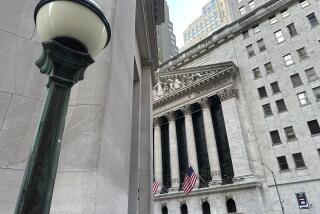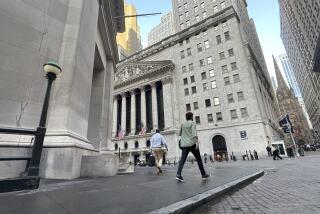Market Snaps Winning Streak
- Share via
U.S. stocks snapped a two-day winning streak Friday, closing modestly lower after another Federal Reserve official weighed in on inflation concerns.
Shorter-term Treasury bond yields ended at multiyear highs, reflecting the belief that the Fed will continue to tighten credit.
After soaring a combined 308 points Wednesday and Thursday, the Dow Jones industrial average slipped 0.64 of a point to 11,014.55 on Friday in a relatively calm trading session.
Broader indexes also lost ground. The Standard & Poor’s 500 eased 4.62 points, or 0.4%, to 1,251.54.
The Russell 2,000 small-stock index gave up 7.98 points, or 1.1%, to 693.07 after surging 3.5% on Thursday. Losers topped winners by a ratio of 7 to 4 on the New York Stock Exchange.
Federal Reserve Bank of St. Louis President William Poole, speaking in South Korea on Friday, said U.S. inflation was outside “our comfort zone” and that “if the inflation rate continues to be persistent like this, the Federal Reserve will simply have to pursue persistent policies that will keep inflation from increasing further.”
Fear of rising inflation has hammered financial markets for much of the last five weeks. The Fed, which in early May had been widely expected to say it was ready to pause in its two-year credit-tightening campaign, now seems virtually certain to raise its benchmark rate from 5% to 5.25% when policymakers gather June 28 and 29.
But investors have been confused by mixed comments from Fed officials. On Thursday, Chairman Ben S. Bernanke sounded less hawkish about inflation in a speech in Chicago. He said that despite rising price pressures, people’s inflation expectations, which could contribute to rising prices, weren’t getting out of control.
That helped stoke the stock market’s rebound in that session.
On Friday, Poole’s comments put a lid on the market, analysts said. But they added that Wall Street also might simply have been exhausted from the week’s hectic trading.
The Dow fell 99 points Monday and 86 points Tuesday, then jumped 110 on Wednesday and 198 on Thursday.
For the week, the 30-stock blue-chip index was up 1.1%. But many analysts questioned whether the bull market could regain traction in the near term and said trading was likely to remain volatile -- a big change from the last few years, when volatility declined substantially.
“Nothing has happened from the fundamental perspective to change the basic fears that have haunted the market since May,” said Russ Koesterich of Barclays Global Investments. “Inflation is accelerating. There’s tighter monetary policy not just here but internationally, and this is going to cause investors to sell riskier assets.”
In the bond market, the yield on the two-year Treasury note ended Friday at 5.16%, up from 5.13% on Thursday and the highest since late 2000. The 10-year T-note ended at 5.13%, up from 5.10% on Thursday.
Foreign stock markets were mixed Friday after big gains Thursday.
Most Asian markets continued to rally. Japan’s Nikkei-225 index rose 2.8%, South Korea’s main index surged 3.5% and India’s Sensex index jumped 3.6%.
But European markets took their cue from Wall Street late in the day and ended mostly lower. The German market lost 0.8%.
The Mexican market edged up 0.6%. Brazil’s main index was a standout, soaring 4.4%. It had been one of the biggest losers of the last month, as investors retreated from equities worldwide, particularly from emerging markets. Brazil’s index still is down 18% from its May 9 record high.
On Wall Street, small-company stocks have been hit hardest over the last five weeks. The Russell 2,000 index, down 1.2% for the week, has lost 11.4% since reaching its record high May 5. By contrast, the Dow is down 5.4% from its six-year high reached on May 10.
The technology-heavy Nasdaq composite index, which fell 14.20 points, or 0.7%, to 2,129.95 on Friday and 0.2% for the week, is down 10% since its multiyear peak in mid-April.
In other trading Friday, near-term oil futures added 38 cents to $69.88 a barrel, but the price was down from $71.63 a week earlier.
Gold futures rose $11.50 to $578 an ounce.
In the stock market, earnings forecasts or results from some companies were well-received, raising hopes that a strong profit-reporting season in July could buttress the market.
Software giant Oracle jumped 49 cents to $14.19 after saying it would report better-than-expected earnings in its fiscal fourth quarter.
Cruise ship firm Carnival reported lower quarterly results but still beat analysts’ estimates. The shares rose $2.02 to $40.19.
More to Read
Inside the business of entertainment
The Wide Shot brings you news, analysis and insights on everything from streaming wars to production — and what it all means for the future.
You may occasionally receive promotional content from the Los Angeles Times.










